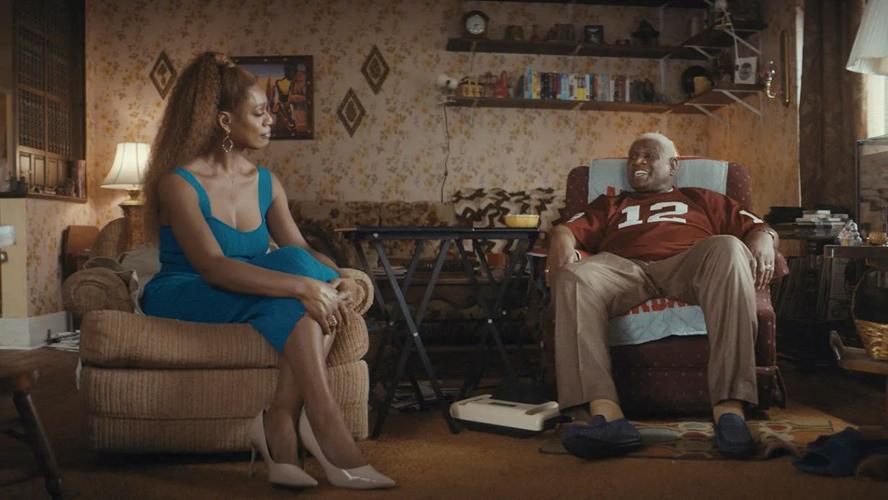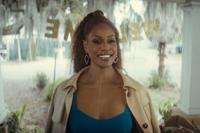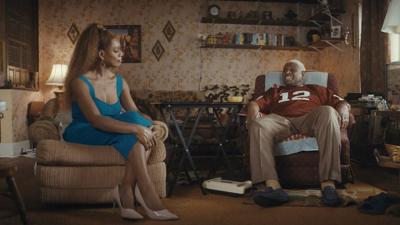It's interesting to learn that Norman Lear is an executive producer on this series. Lear is the creator of such iconic shows, such as All in the Family (1971). Echoes or elements of All in the Family are present here. George Wallace, a standup comedian since the 1970's, stars as Harry Slate, the owner of a car wash in Mobile, Alabama. He's very much an Archie Bunker type. Yet, Harry is a watered down version. There's no bite or edge to Harry. He's somewhat of a curmudgeon, but that's not much. It's not about making him a bigot or hard ring-wing person, which Archie Bunker was. Harry could've been like Larry David's character in Curb Your Enthusiasm (2000) or even like Bernie Mac's character in The Bernie Mac Show (2001). Yet, Harry really feels rather toothless.
Laverne Cox (Promising Young Woman and Orange Is the New Black) stars as Desiree, a Black transgender woman who is the daughter of Harry. She left Alabama 23 years ago to start a life in New York City. When she did, she cut off contact with her father because of macho or homophobic comments he made. She transitioned after she left, so when she returns after losing her job and her boyfriend, she surprises her dad who thinks he'll see his son. Given how personable and charismatic Harry is, it's odd that he never reached out or wondered about his so-called son in 23 years, but the series never reckons with that. Cox is also a co-creator of this series. Her Emmy-nominated role in Orange Is the New Black was in many ways a tragic character. For this character, I understand the impulse not to have any transphobia or bigotry aimed at her identity at all. The first episode addresses her reason for leaving, but the distance and absence feel more like a gimmick for having her surprise Harry at his front door.

Otherwise, this series is the opposite of All in the Family. It's not about confronting or tackling social issues in a way that feels confrontational or in a way that feels like a tackle. This series is more akin to the films or programs on Hallmark Channel, which often are Christmas-based stories about women from a city who come home to the country to get back in touch with their roots, all while falling in love with the country boy next door. Even though it wasn't on Hallmark, Cox seems to want to be Reese Witherspoon's character in Sweet Home Alabama (2002).
Jay Wilkison (Younger and Nashville) co-stars as Mack, the stereotypical country boy character in so many Hallmark Channel movies. He's a relatively good-looking guy but for one reason or another he's a single dad. He's working-class, rustic, but very charming and perfect teeth. He becomes an obvious love interest in what ultimately is a romantic comedy. Mack meets Desiree because he works and in fact co-owns Harry's car wash. The wrinkle is that he used to be in prison, so thematically he also has a past that he's trying to move past. The details of his incarceration aren't explored. It comes across as a kind of quirk for his character, rather than anything substantive.

Desiree does discriminate against him because of his incarceration and the fact that he's a working-class redneck. It's more about her overcoming her issues about what she feels she deserves and not feeling like she has to struggle. Cox also probably didn't want a relationship between a trans-person and a cisgendered person where being trans is a wedge or hurdle. I'm sure she wanted the relationship between Desiree and Mack not to have a whiff of transphobia, which is great. The people involved in this series also wanted the same audience as the Hallmark Channel, meaning acceptable for children to watch or families who are Christian. Therefore, this series hints but never actually explores sex or sexuality.
For example, Mack seemingly identifies as heterosexual or straight. Yet, he's interested in Desiree who is a trans-woman. Mack seems attracted to Desiree more than in a platonic way. I'm not sure how much he knows about trans-women, but a lot of trans-women have not had gender-affirming surgery, mainly because a lot of Black trans-women can't afford it. This doesn't necessarily seem to be the case for Desiree. She seems fully transitioned having had a wealthy life in New York City, but this series doesn't ever and probably will never touch upon that. However, if Mack fell for a trans-woman who didn't have the surgery, which is perfectly fine, what would that mean for his sexuality? It's ridiculous to think that Mack wouldn't think about that or consider it.

Sexuality is complicated and Mack's attraction to Desiree wouldn't necessarily change his sexuality, but, given this series has a Black, gay character named Louis Alexander Dunbar, played by D. K. Uzoukwu (The Misadventures of Awkward Black Girl), it's not out of the question to have Mack ask that question of himself. It would also make sense for Louis to ask that question of Mack. Yet, it's also a shame that the story given to Louis is a coming-out one. Yes, he lives in Alabama. He works for the church, which does have a transphobic and possibly homophobic pastor, but having yet another closeted, Black, gay character feels regressive in 2025.
Rated 13+.
Running Time: 30 mins.
Available on Amazon Prime.








